Laxmi Sorte and Kaustav Ghosh are on a 101-day road trip across India to support and encourage local businesses affected by the pandemic.
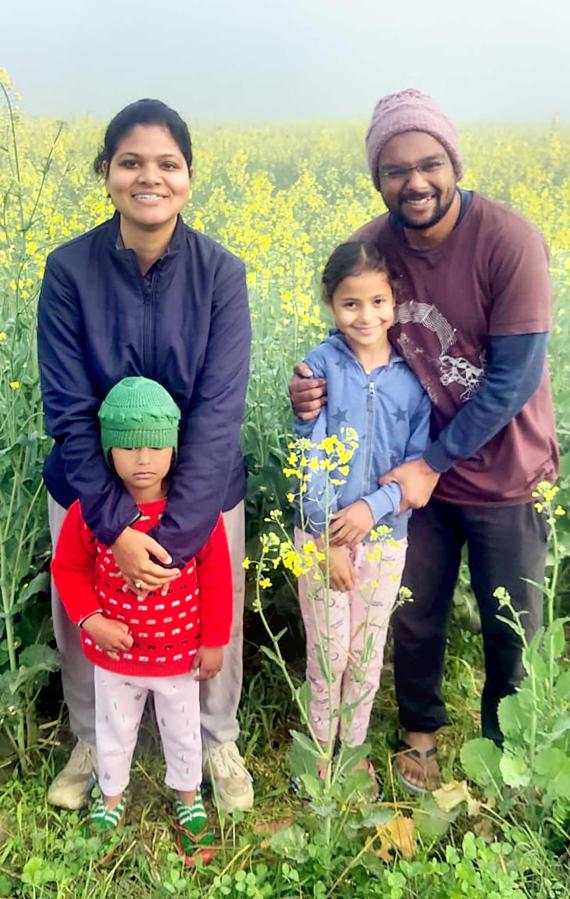
"There are two types of people in the world -- tourists and travellers," says Kaustav Ghosh, founder of The Great Indian Travel campaign.
Kaustav and his wife, artist Laxmi Sorte, are on a unique 101-day road trip across India to support and connect small businesses to the rest of the world.
"While tourists are less conscious people and prefer exploring the more popular places, travellers are more conscious of the land. They respect the environment and connect better with the local people, which makes their purpose of travel more meaningful," the 31-year-old Mumbai-based entrepreneur tells Rediff.com's Divya Nair over a telephone call from Punjab.
The couple had traversed 15,605 km across India at the time of the interview.
"Punjab is the 25th state we've entered. We have also covered two Union territories, Pondicherry and Jammu and Kashmir, in our quest to explore the real and raw India, untouched by tourists."
The couple began their journey from Kharghar, Navi Mumbai, on December 1, 2021, and plan to return on March 11 after covering 29 states and five Union territories.
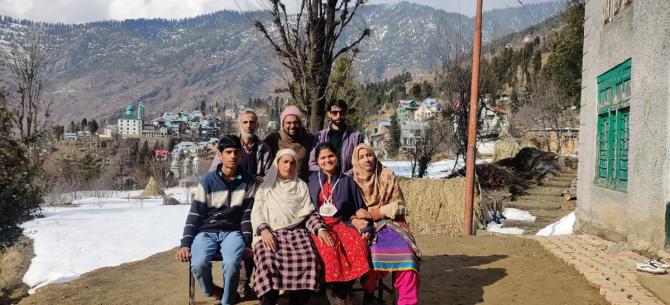
It was during their trip to the north east about two-and-a-half years ago that Kaustav and Laxmi first had what they call "this really crazy idea -- why not cover all of India at one go?"
When the pandemic hit almost immediately after, they were not discouraged. They just tweaked their love for travel, and their business idea, into a unique project.
The couple were already working on their free-of-cost campaign, 'I support your business. I support you', through which they were helping small local businesses build communities so they could sustain during tough, uncertain times like the pandemic.
"In our first campaign, we connected with over 100 businesses and reached an audience of 75 lakh people in just a few months. This inspired us to take it to the next level," says Kaustav.
"We wanted to reach out to more local businesses, guide them with marketing strategies and share their stories with the rest of the world. That's how the idea of the Great Indian Travel was born.
The Great Indian Travel combines Kaustav and Laxmi's goals to travel, network and experience the real India so they can build a larger network of sustainable communities across the country.
"We hired a team of 10-12 people who are now working with us on the project for 12 months. As part of this campaign, we are meeting people in different places and offering them information and guidance on how they can strategise and optimise their businesses," says Laxmi, 31, who works with corporates and start-ups across India.
In the 77 days since they left home, Laxmi and Kaustav have met and mentored over 700 people through various Rotary Clubs, Rotaract Clubs and Inner Wheel Clubs across India.
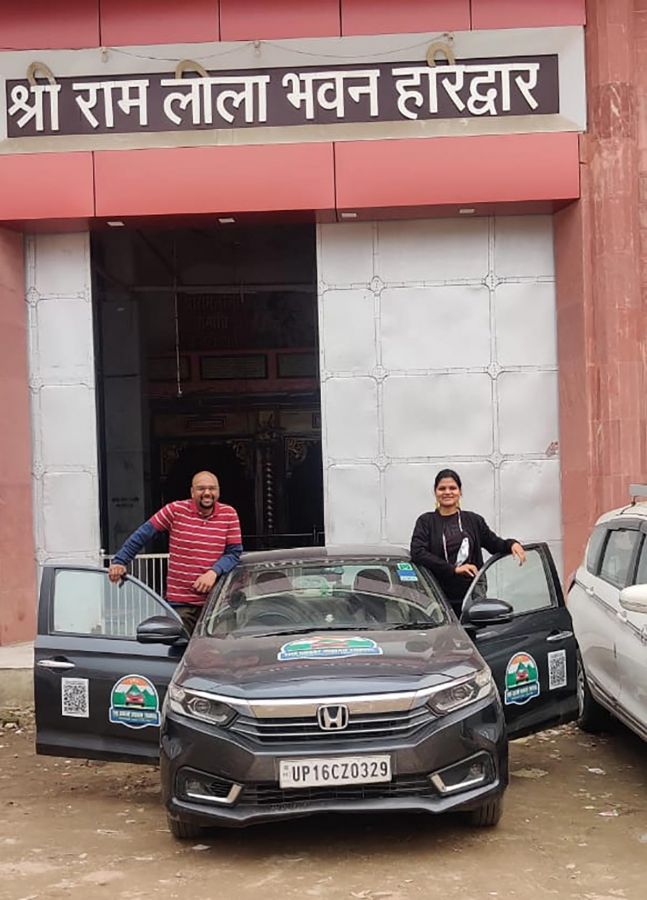
Except for the vehicle, which is sponsored by Honda (the couple is driving the Honda Amaze), the couple have self-funded their road trip.
"Although we have saved Rs 5 lakhs (Rs 500,000) for this trip, I want to complete it under Rs 3 lakhs (Rs 300,000). I am keeping a tab of our daily expenses so, in case anyone wants to know, I want to tell them that it's possible to travel all around the country within a limited budget," says Laxmi.
"We drive between 250 to 300 km every day. We spend approximately Rs 1,200 per day on petrol, Rs 700 on accommodation, Rs 400-500 on food and Rs 100 for miscellaneous expenses," she adds.
"Wherever it is possible, we try to connect with locals, friends or family members to save on the cost of accommodation. We try to have one good meal a day and not splurge on shopping. Since the vehicle is sponsored by Honda and the mileage is good, it is serviced after every 5,000 km," explains Laxmi.
"A rented car would have cost us much more," she adds.
The couple have limited their luggage to four suitcases.
"One of them is empty; it is reserved for used clothes when we cannot do our laundry.
"We did not shop too much for this trip. I borrowed most of the winter clothes from friends and family members.
"Also, we didn't pack too much food or essentials because we are in India where everything is accessible and affordable," says Laxmi.

Both Laxmi and Kaustav believe in taking risks; they also believe that their fellow country people are kind and loving.
"In Bastar, we stayed with tribals.
"In Kashmir, we drove to Bunjwah in Kishtwar district of Jammu where we stayed with (journalist and activist) Shafqat Shaikh's family. We'd never met before. We'd only interacted with online, but he invited us to his home.
"When we enquired with the local Rotary Club, we were advised not to travel because the roads were inaccessible and it could be risky if we got stuck. Thank God we trusted our instincts and took that risk; we got to experience real hospitality in Jammu. Absolute strangers invited us to their homes to have chai.
"Even in Manipur, when we got stranded in Nungba (town), we didn't know what to do. It was 8.30 pm and pitch dark. The shops had closed and there was not a soul on the road. The Manipur police were really helpful and guided us to safety."
The entire trip -- which Kaustav says is a "lifetime learning investment" -- has taught him to follow his heart.
"The general perception is that states like Jammu and Kashmir, Nagaland and Manipur are sensitive; they are in the news for all the wrong reasons.
"I can tell you from my experience -- don't believe everything you hear or what other people tell you. You have to experience it for yourself to know what India really is.
"The real India is not what they show you in touristy places. The real India is seen in its culture, the diversity of its locals. It's pure, unexplored and that's what people should know and connect with."
From starting their day with noon chai (salted tea) in Kashmir to devouring red ant chutney in tribal Bastar (popularly sampled by Gordon Ramsey) to tasting different varieties of local beer, including the moha beer (made from sunflower seeds), Laxmi and Kaustav have exciting stories they want to document and tell the world when they are back.
Emphasising the importance of a clear road map and fuel strategy, Kaustav shares an experience he'll never forget.
"Usually, we refuel when the gauge drops below 50 per cent. But when we entered Mizoram from Tripura and were travelling towards Aizawl, we couldn't find a fuel station. We had no option but to take a 70 kilometre detour. The roads were being repaired so we had to drive over two hours to refuel and resume our journey."
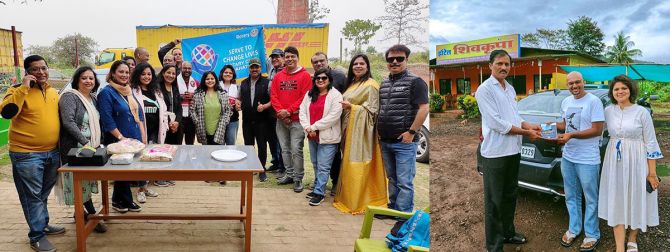
Since they are both fully vaccinated, they were allowed to enter most states in India.
"We took all precautions and followed each state's guidelines and protocols. In most states, we had to just produce our vaccination certificates. However, in Sikkim, Manipur, Meghalaya and Kashmir, we had to do an RT-PCR," says Laxmi.
She has useful advice for female travellers, especially those planning long road trips.
"It is crucial to have access to clean toilets and washrooms. It is very important to take a bath or clean yourself, especially if you are having your periods.
"Since we are not on a leisure trip, I have packed conservative clothes. I knew we would we meeting people for work so I included kurtis, tops and track pants that would allow me to mix and match, depending on the weather and the activities we'd be involved in."
Kaustav and Laxmi have also been sharing their travel stories on social media, tagging the people and businesses they've interacted with, hoping it will help them reach out to a larger network.
Here's Kaustav's simple advice for start-ups:
"Indirect marketing is the best way to promote your business. Think of ideas that will inspire people who will then want to know more about you and your business. Networking is the key.
"Do crazy stuff. Take risks so you can learn something new.
"My idea is to inspire more people to travel within India. India is so vast and beautiful that you will never have had enough."
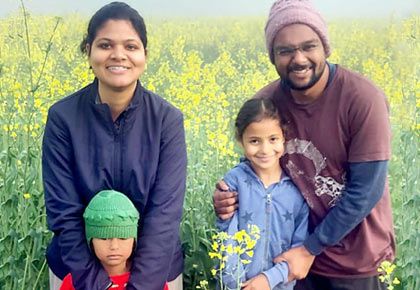











 © 2025
© 2025